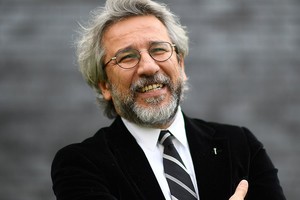By Colette Davidson
But it is perhaps his most recent position as editor-in-chief of Turkey’s oldest and most prestigious newspaper, Cumhuriyet, which has garnered Dündar the most attention.
In November 2015, he was arrested after Cumhuriyet published footage of Turkish intelligence agents smuggling weapons to Syrian rebel fighters, which the country’s President Recep Tayyip Erdoğan had denied.
Dündar was charged with espionage, being part of a terrorist organization and revealing confidential documents. He spent 92 days in prison until his release in February 2016, when the Supreme Court decided that his detention was an “undue deprivation of liberty.”
But his freedom was short-lived. In May 2016, Dündar was awaiting the judge’s decision on his guilt or innocence in front of an Istanbul courthouse when a gunman made an attempt on his life. While his wife as well as a member of parliament were able to wrestle the assailant to the ground and Dündar got away unscathed, the judge later sentenced him to five years and 10 months in prison for revealing state secrets.
Dündar says he always knew that publishing the footage – along with any content that goes against the government – would be risky.
“It’s like that in countries such as Turkey if you touch on sensitive topics,” he says from his adopted home in Germany, where he has lived in exile since June 2016. “Our history is full of attack, assassination and imprisonment of journalists.”
There were a total of 81 journalists in jail in Turkey as of December 2016, according to the Committee to Protect Journalists (CPJ), with the remaining operating under the confines of an increasingly controlling government. Since Turkey’s failed Coup d’Etat on July 15, 2016, President Erdoğan has gained overarching powers that have threatened the country’s democracy. Reports suggest there are as many as 150 journalists now behind bars.
During the three-month state of emergency that followed the failed coup, the president and his cabinet were able to bypass parliament in drafting new laws and suspending certain freedoms.
Erdoğan’s broader powers of arrest and ability to impose restrictions on publications are just some of the ways his government has curtailed personal freedoms and silenced the media. Turkey is currently ranked 151st out of 180 countries in Reporters Without Borders’ 2016 World Press Freedom index.
Known for its impartial reporting, Dündar’s former newspaper has felt the brunt of President Erdoğan’s controls over the years. Cumhuriyet, popular with the country’s secular left, had its Istanbul office doused with a molotov cocktail in 2008, and several of its staff have been physically attacked or imprisoned in recent years.
Dündar says that the level of government pressure and repression of the media is so substantial that publications end up publishing the same material and headlines in an attempt to play it safe.
“There is so much self-censorship that there’s almost no need to censor journalists in Turkey,” says Dündar. “Under these circumstances, it’s impossible for journalists to do their jobs.”
Since moving to Germany, Dündar writes for the daily Die Zeit and has become a de facto activist, pushing the media, politicians and trade organizations to find solidarity with journalists and the Turkish people. But his future in Turkey’s media landscape – and Turkey in general – remain uncertain.
In August 2016, Dündar officially resigned from his position as editor-in-chief of Cumhuriyet, and he currently has six warrants out for his arrest. The only way for Dündar to return home – where his wife still lives – is for President Erdoğan to leave power.
Despite the odds, Dündar remains positive about his situation, as President Erdoğan has recently begun to lose political ground, both at home and in the eyes of the international community.
“I’m hopeful,” says Dündar. “I have enough reasons to be hopeful.”
Can Dündar is WAN-IFRA’s recipient of the 2017 Golden Pen of Freedom award, an annual award that recognises the outstanding action, in writing or deed, of an individual, a group or an institution in the cause of press freedom.




